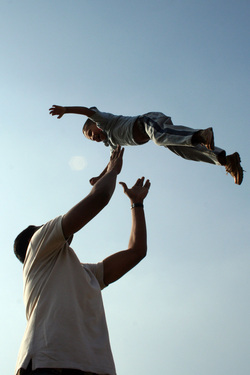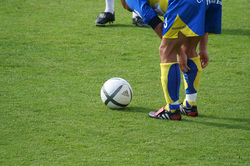Sport Parenting Clinic
In this course we will go through ways to understand your child’s needs as an athlete which will also include diet and nutrition.
Ten Ways to be a successful sport parent
Ten Ways to be a successful athlete1. Always enjoy the sport and have fun, whether it's
practice or game day. 2. You must play and understand the rules/laws of the sport. 3. Give your best effort. 4. Tell an adult you trust (parent, coach, teacher) if something was said or done that did not feel comfortable to you. 5. Make new friends/teammates. 6. Respect and appreciate your teammates, coaches, officials, parents and others for their efforts. 7. Respect the places where you play and the equipment that you use. 8. Listen to and learn from instructions given. 9. Prepare for practice and games by drinking plenty of water and eating foods that are good for you and your body. 10. Be on time for all practices and games. |
1.) Keep the fun in sports
It is the number one reason children play sports. 2.) Do no Harm Motivate with praise, no name calling and put downs. Call authorities with a report of suspected physical and sexual abuse of your child or other children. 3.) Know your child athlete Recognize what motivates your child to play a sport 4.) Know yourself Recognize what motivates you to have a child play a sport. Do you promote your child playing sports because it will help build positive self-expression, a strong work ethic, morals and cooperation through team building or because you are trying to fulfill your personal needs? 5.) Model good sports behaviour Don't criticize or blame other players, coaches, officials or other parents. Your actions speak louder than words and non-verbal messages speak volumes. 6.) Be positive You give power to what you focus on. 7.) Appreciate effort Emphasize the challenge and rewards of the sport, not only winning. 8.) Empower your child to speak up Tell your child that they can talk to you if something was said or done to make them feel uncomfortable on the sports field or anywhere. Listen to your child and address any fears. 9.) Know the sport your child plays Learn the rules of the sport so that you can react appropriately during your child's games. 10.) Communicate Communicate with both your child and your child's coaches. Communication includes active listening. Don't be afraid to talk to the coach. A good rule of thumb is the 24 hour rule. |
Feel free to view this video related to sport parenting and what kids
wished their parents knew about sportsmanship.
Healthy Eating Guide
|
Below are the food groups that would be recommended for an athlete to control to gain optimum performance: In limited Quantities: Red meat and butter, white rice, white bread, potatoes, pasta and sweets. For Almost Everybody: Vitamin supplements. Alcoholic Drinks: Moderate consumption (unless otherwise directed) 1-2 Portions a Day: Dairy products and calcium supplements 0-2 Portions a Day: Fish, poultry and eggs. 1-3 Portions a Day: Nuts and pulses. 2-3 Portions a Day: Fruit. In abundance: Vegetables. Always: Whole meal foods. At almost every meal: Vegetable oils (soy, corn, sunflower, olive oil, etc) Healthy Reminders: Athletes need colorful food on their plates. Athletes need to drink 8 plus glasses of water daily. Teenager require at least 8-9 hours of sleep at night for optimum rest. |
Books:
Rainer, Martin. Sport Parents, Human Kinetics, Champaign, IL. 1994
Bigelow, Bob; Tom Moroney; Linda Hall. Let the Kids Play, Health Communication, Inc., Deerfield Beach, FL. 2001.
Engh, Fred. Why Johnny Hates Sports. Avery Publishing Group,Garden City Park, NY, 1999.
Gaffney, Carol. Coaching Guide For Better Parents and Stronger Kids, Book Partners, Wilsonville, Or. 1997.
LeVay, Simon, The Sexual Brain, MIT Press, Cambridge, MA 1993.
Litt, Ann. Fuel for Young Athletes, Human Kinetics, 2004.
Margenau, Eric. Sports Without Pressure: A Guide For Parents and Coaches of Young Athletes, Gardner Press, 1990.
Martens, Rainer. Joy and Sadness in Children’s Sports, Human Kinetics, Champaign, IL, 1978.
Turnopolsky, Mark, PhD. Gender Differences in Metabolism: Practical and Nutritional Implications, Modern Nutrition, 1998.
Articles:
“Breaking Barriers: Keeping Youth Sports Safe and Fun,” Girls and Women’s Sports Initiative, Minnesota Amateur Sports Commission,
Blaine, MN.
“Coaching Code of Ethics,” United States Olympic Committee, Olympic Coach, Vol. 5, No. 4, February 17, 2003.
“Do You Know How to Feed Your Child Athlete?” Internet Article: http://www.kidshealth.org/parent/nutrition_fit/fitness/feed_child_athlete.html
Rainer, Martin. Sport Parents, Human Kinetics, Champaign, IL. 1994
Bigelow, Bob; Tom Moroney; Linda Hall. Let the Kids Play, Health Communication, Inc., Deerfield Beach, FL. 2001.
Engh, Fred. Why Johnny Hates Sports. Avery Publishing Group,Garden City Park, NY, 1999.
Gaffney, Carol. Coaching Guide For Better Parents and Stronger Kids, Book Partners, Wilsonville, Or. 1997.
LeVay, Simon, The Sexual Brain, MIT Press, Cambridge, MA 1993.
Litt, Ann. Fuel for Young Athletes, Human Kinetics, 2004.
Margenau, Eric. Sports Without Pressure: A Guide For Parents and Coaches of Young Athletes, Gardner Press, 1990.
Martens, Rainer. Joy and Sadness in Children’s Sports, Human Kinetics, Champaign, IL, 1978.
Turnopolsky, Mark, PhD. Gender Differences in Metabolism: Practical and Nutritional Implications, Modern Nutrition, 1998.
Articles:
“Breaking Barriers: Keeping Youth Sports Safe and Fun,” Girls and Women’s Sports Initiative, Minnesota Amateur Sports Commission,
Blaine, MN.
“Coaching Code of Ethics,” United States Olympic Committee, Olympic Coach, Vol. 5, No. 4, February 17, 2003.
“Do You Know How to Feed Your Child Athlete?” Internet Article: http://www.kidshealth.org/parent/nutrition_fit/fitness/feed_child_athlete.html
Ready to take the test?
Please read the instructions below.
Please read the instructions below.
You are about to take take a test to be certified through the Positive Sport Coaching Program.
While taking this test:
-If an error occurs use the "back" or "refresh" button to allow for the questions to proceed.
-The password for the test is Sport Parent
-You must answer each question, even if it may not be correct. Don't worry, you are able to take it twice.
-An e-mail will be sent to you with upon passing and a certificate of completion
-Good luck and enjoy gaining knowledge on how you can be a Positive Sport Coach!
While taking this test:
-If an error occurs use the "back" or "refresh" button to allow for the questions to proceed.
-The password for the test is Sport Parent
-You must answer each question, even if it may not be correct. Don't worry, you are able to take it twice.
-An e-mail will be sent to you with upon passing and a certificate of completion
-Good luck and enjoy gaining knowledge on how you can be a Positive Sport Coach!





